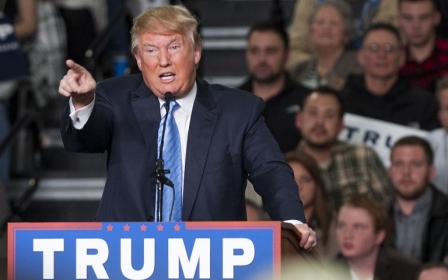British MPs debate petition to ban Donald Trump

British MPs on Monday debated a petition calling for US Republican frontrunner Donald Trump to be banned from the country.
The MPs were mandated to discuss the issue after an online petition on the UK parliamentary website garnered over 574,000 signatures late last year, although the government has already said it will not go ahead with any ban.
The debate is the direct result of an online petition which has garnered more than 574,000 signatures but the government, which has the ultimate say, has already said it will not go ahead with any ban.
British lawmakers are obliged to consider for debate any petition on the government's official petitions website that reaches 100,000 signatures.
The e-petition followed calls by the billionaire Republican presidential candidate in December for a “total and complete shutdown” of Muslim immigration into the US.
Paul Flynn, a left-wing Labour MP, led the debate, comparing the potential banning of Trump to a previous decision by the British Home Secretary to ban the Islamophobic Danish politician Geert Wilders from the UK.
However, Flynn opposed banning Trump from the UK.
“I would urge the alternative of inviting him here and I would be delighted if he could show where the so-called no-go areas are in this country, I’ve never been able to find one,” he said.
Labour leader Jeremy Corbyn told the Andrew Marr show on Sunday that he did not favour banning Trump and hoped that he would come to the UK and visit the country’s mosques.
“I think he should come here and he should have lessons in going to all our cities,” he said. “Why he can’t he go to Leicester, Birmingham, Newcastle and see we do have great diversity within our society?
“Take a walk around central Manchester, take a walk round any of our cities, and understand that, yes, we’ve got problems but we’ve also got a great community, a great society and cohesion. He might learn something, you never know.”
Prime Minister David Cameron has called the outspoken billionaire's remarks on Muslims "divisive, stupid and wrong" but said he was opposed to a ban.
"I think if he came to visit our country, he would unite us all against him," Cameron said last month.
One MP during the debate did note that it was ironic that the second highest number of signatures on the UK e-petitions website - with 457,113 signatures - called for a stop to “all immigration and close the UK borders until ISIS is defeated.”
Labour MP Tulip Siddiq said Trump should not be given a visa to visit the UK and highlighted the restriction of an anti-Muslim blogger with “strikingly similar” views as an example where a similar figure had been restricted.
“Her crime was that she equated the views of the entire Muslim population with a handful of extremists,” she said.
Rightwing Conservative MP Edward Leigh condemned the calls for Trump to be banned as a clampdown on freedom of expression.
"If we only allow free speech for those we already agree with, is that free speech at all?" he said.
He also described the discussion as an attempt to "shut down an honest debate about immigration".
Donald Trump will scrap $1bn of planned investments in Britain if he is banned from entering the country, a spokesman for the US politician's business empire said on Wednesday.
British lawmakers are expected to debate whether the Republican presidential candidate should be barred from Britain for an alleged "hate speech", a move the Trump Organisation said would set a "dangerous precedent".
Some on Twitter wryly noted that, regardless of the decision of debaters, no action would be taken on the basis of the discussion:
Stay informed with MEE's newsletters
Sign up to get the latest alerts, insights and analysis, starting with Turkey Unpacked
Middle East Eye delivers independent and unrivalled coverage and analysis of the Middle East, North Africa and beyond. To learn more about republishing this content and the associated fees, please fill out this form. More about MEE can be found here.



